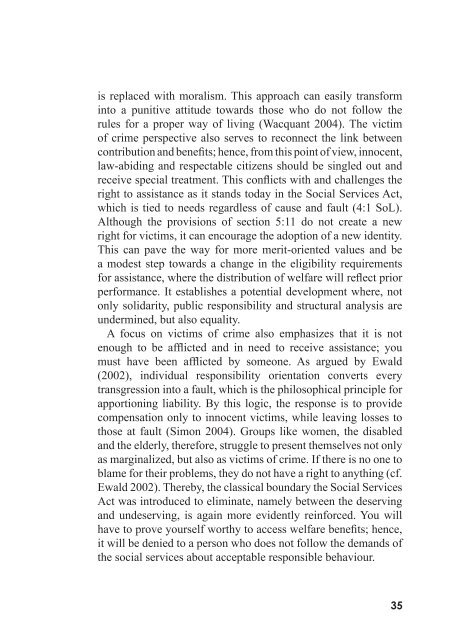Thinking with Bevereley Skeggs - Stockholms universitet
Thinking with Bevereley Skeggs - Stockholms universitet
Thinking with Bevereley Skeggs - Stockholms universitet
- No tags were found...
Create successful ePaper yourself
Turn your PDF publications into a flip-book with our unique Google optimized e-Paper software.
is replaced <strong>with</strong> moralism. This approach can easily transforminto a punitive attitude towards those who do not follow therules for a proper way of living (Wacquant 2004). The victimof crime perspective also serves to reconnect the link betweencontribution and benefits; hence, from this point of view, innocent,law-abiding and respectable citizens should be singled out andreceive special treatment. This conflicts <strong>with</strong> and challenges theright to assistance as it stands today in the Social Services Act,which is tied to needs regardless of cause and fault (4:1 SoL).Although the provisions of section 5:11 do not create a newright for victims, it can encourage the adoption of a new identity.This can pave the way for more merit-oriented values and bea modest step towards a change in the eligibility requirementsfor assistance, where the distribution of welfare will reflect priorperformance. It establishes a potential development where, notonly solidarity, public responsibility and structural analysis areundermined, but also equality.A focus on victims of crime also emphasizes that it is notenough to be afflicted and in need to receive assistance; youmust have been afflicted by someone. As argued by Ewald(2002), individual responsibility orientation converts everytransgression into a fault, which is the philosophical principle forapportioning liability. By this logic, the response is to providecompensation only to innocent victims, while leaving losses tothose at fault (Simon 2004). Groups like women, the disabledand the elderly, therefore, struggle to present themselves not onlyas marginalized, but also as victims of crime. If there is no one toblame for their problems, they do not have a right to anything (cf.Ewald 2002). Thereby, the classical boundary the Social ServicesAct was introduced to eliminate, namely between the deservingand undeserving, is again more evidently reinforced. You willhave to prove yourself worthy to access welfare benefits; hence,it will be denied to a person who does not follow the demands ofthe social services about acceptable responsible behaviour.35
















